 MyDogBreeds
MyDogBreeds Polish Tatra Sheepdog is originated from Poland but Keeshond is originated from Netherlands. Polish Tatra Sheepdog may grow 22 cm / 9 inches higher than Keeshond. Polish Tatra Sheepdog may weigh 42 kg / 93 pounds more than Keeshond. Both Polish Tatra Sheepdog and Keeshond has almost same life span. Polish Tatra Sheepdog may have less litter size than Keeshond. Both Polish Tatra Sheepdog and Keeshond requires Moderate maintenance.
Polish Tatra Sheepdog is originated from Poland but Keeshond is originated from Netherlands. Polish Tatra Sheepdog may grow 22 cm / 9 inches higher than Keeshond. Polish Tatra Sheepdog may weigh 42 kg / 93 pounds more than Keeshond. Both Polish Tatra Sheepdog and Keeshond has almost same life span. Polish Tatra Sheepdog may have less litter size than Keeshond. Both Polish Tatra Sheepdog and Keeshond requires Moderate maintenance.
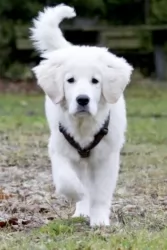 Known also as the Tatra Mountain Sheepdog, Polish Mountain Sheepdog or the Polski Owczarek, the Polish Tatra Sheepdog comes from Poland.
Known also as the Tatra Mountain Sheepdog, Polish Mountain Sheepdog or the Polski Owczarek, the Polish Tatra Sheepdog comes from Poland.
Shepherds were wanting an excellent guard dog for their livestock, and this dog has a natural instinct for guarding. Apart from being a good protection dog, the dog is also a superb companion.
This is a rare dog breed and not recognized by the AKC. This is actually an ancient breed, and the dog has lived in the Polish mountains for thousands of years. When the breed actually came about hasn’t been recorded. Some people suggest the Tatra Sheepdog comes from the Mastiff dog.
After the World Wars the dog’s number had been reduced and the Federation Cynologique Internationale started breeding the dog in the 1960s.
 Keeshond is the term used for German Spitzes and although many American references have it that the Keeshond originated in the Netherlands, some say the dog originated in Germany and is a member of the German Spitz family.
Keeshond is the term used for German Spitzes and although many American references have it that the Keeshond originated in the Netherlands, some say the dog originated in Germany and is a member of the German Spitz family.
The Club for German Spitzes was founded in 1899. The Nederlandse Keeshond Club was formed in 1924. The Keeshond is also referred to as ‘The Smiling Dutchman’.
It was in the 17th and 18th centuries that the Keeshond was used greatly as a watchdog, appearing in England in the late 1800s, but after the turn of the 20th century, Mrs. Wingfield Digby of Dorset, England and Mrs. Alice Gatacre, a Dutch breed authority, living in England, stirred interest in the breed with their kennels.
An English breed Club was formed in 1926, and the first Keeshond was registered with The American Kennel Club in 1930.
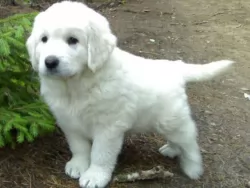 If you bring a Polish Tatra Sheepdog puppy into your home you might think you had a gorgeous Polar Pear Cub roaming around – that’s how cute they are.
If you bring a Polish Tatra Sheepdog puppy into your home you might think you had a gorgeous Polar Pear Cub roaming around – that’s how cute they are.
These are large, well built white coated dogs and the average height for them as an adult is between 60 to 70cm, male and female. Weight of the dog is between 36 and 60kg.
The double coat is medium length and thick. The ears are medium length and floppy and the tail is long and carried low when the dog is at rest, but it is carried up and over the back when the dog is alert and watchful.
These dogs have a lot of characteristics that make it such a good guardian dog. He is territorial, bold, protective, loyal and always loving towards his human family.
The Tatra has a loud bark and he uses this when he is wary of anything that he thinks may harm his family. He is an intelligent dog too, and you won’t have any trouble training and socializing him.
 The Keeshond is a medium-sized dog and a member of the Spitz group of dogs. He stands at 43 – 48cm in height and weighs 14 – 18kg.
The Keeshond is a medium-sized dog and a member of the Spitz group of dogs. He stands at 43 – 48cm in height and weighs 14 – 18kg.
He has a 2-layered, dense coat which is fairly long, straight and coarse and colors are grey, silver, black and cream. His undercoat is a very light cream color. He has erect ears, a fairly shop muzzle and a feathery, plumed tail which curves over his back.
The hair on his legs is fairly short accompanied with some feathering. A typical marking-feature of the Keeshond is the dark line which runs from the outer corner of each eye to the lower corner of each ear. It's what gives the dog his well known keeshond expression. The eyes of the dog are dark brown.
The Keeshond, just like other Spitz dogs, are playful, affectionate, friendly and eager to please. He is intelligent too and will respond well to training and socialization.
He makes a wonderful family pet as he is friendly and playful with children, loving all their games. He gets on well with other pets too. He is a social dog, thriving on being with his human family, wanting to participate in all family activities.
They are sensitive, loving pets and become very attached to their owners. They have even been used as comfort dogs in rescue situations, as they bond so well with people.
He makes a good watchdog too with his loud bark which he uses to deter intruders. He may well be a good watch- and guard dog but he isn't an aggressive dog.
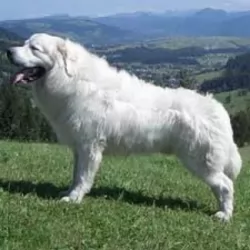 These large sheepdogs have always been guard dogs – they were bred to guard sheep and have always spent a lot of time on their own, away from humans.
These large sheepdogs have always been guard dogs – they were bred to guard sheep and have always spent a lot of time on their own, away from humans.
To many people, he may seem to be somewhat aloof and independent, but for people looking for a guard dog, this particular characteristic is particularly appealing.
Nonetheless, brought up with lots of love and care he makes the most devoted, loving pet.
 The Keeshond, with his thick double coat, loves to be outdoors in cool weather. He won't be there too long however, because he will be missing his human family. He is such a social dog, craving human company and therefore isn't a dog to be put out in the backyard and left day after day.
The Keeshond, with his thick double coat, loves to be outdoors in cool weather. He won't be there too long however, because he will be missing his human family. He is such a social dog, craving human company and therefore isn't a dog to be put out in the backyard and left day after day.
He loves games and being totally involved with his human family. Look after your Keeshond well – he is a companion dog - and you will find him to be a most exceptional friend of yours.
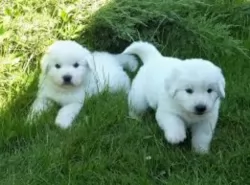 While your Polish Tatra Sheepdog isn’t likely to suffer from any major dog health issues if he is well fed, well exercised and loved, he may well succumb to one or two of some of the typical illnesses there are that plague dogs -
While your Polish Tatra Sheepdog isn’t likely to suffer from any major dog health issues if he is well fed, well exercised and loved, he may well succumb to one or two of some of the typical illnesses there are that plague dogs -
This is such a common- and serious problem with dogs, that it bears mentioning. Hip dysplasia is a problem with the hips so that the bones don’t fit- and move properly. The end result for the dog is pain, inflammation and swelling. Your dog is reluctant to play and get up again after lying down. Arthritis can set in which can also be painful. There are treatments to help with managing pain, but in some instances, surgery may be required.
Because the Polish Tatra Sheepdog is a deep chested dog, he is more prone to bloat, which is life threatening. Gas is trapped in the stomach, the stomach twists and the dog has a swollen stomach, is restless and in stress. Immediate veterinary intervention will be required.
This can be debilitating for your dog as he wants to be licking and scratching the whole time. Usually you’ll see this in the paw- and stomach area. There are a range of medications that the vet will suggest.
 With good food, fresh water, exercise and lots of interaction with your Keeshond, he can reach 12 to 14 years of age.
With good food, fresh water, exercise and lots of interaction with your Keeshond, he can reach 12 to 14 years of age.
No matter how healthy your dog is, he can still get ill, but the chances are less likely when he is feed nutritionally. Nonetheless look out for hip dysplasia, bloat, ear infections, skin rashes and eye diseases.
This is a problem in the lens of the eye. Your dog has a cloudy look to the eye. A cataract can occur when the cells are damaged. A disease such as diabetes can also cause a cataract and high blood sugar levels can change the metabolism of the cells in the lens.
The lens should be crystal clear, but with a cataract, the vision of the dog is obscured. It can cause blindness. Thankfully, cataracts aren't painful and most times dogs with cataracts can still see. There is the option of surgery to remove them too.
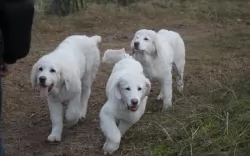 The Polish Tatra Sheepdog is an energetic dog and this means he will require a large sized garden to run around in. As a large, active dog he isn’t recommended for city living but would suit a large property where he can be well exercised. Because of its size and energy levels, regular walks will be recommended. Provide the dog with stimulating games that will be mentally and physically beneficial.
The Polish Tatra Sheepdog is an energetic dog and this means he will require a large sized garden to run around in. As a large, active dog he isn’t recommended for city living but would suit a large property where he can be well exercised. Because of its size and energy levels, regular walks will be recommended. Provide the dog with stimulating games that will be mentally and physically beneficial.
This large dog sheds, and seasonally too, so he will need to be brushed at least twice a week to prevent loose hair.
Check inside your dog’s ears for infection.
Trim your dog’s nails.
Check your dog for fleas and ticks and check him over for any unusual lumps.
Every pet lover wants their dog to live a long, healthy, active life. That is why it is so important to choose the best dog food.
If you buy commercially manufactured dog food, make sure its the high quality ones to ensure its properly formulated to provide your pet with all the vitamins and minerals he needs.
Home-made food is also an excellent choice for your pet. Boiled chicken, brown rice or pasta and spinach, sweet potatoes and carrots can be very healthy, and you can chop this up and add it into the dry kibble a couple of times a week. This is a super tasty treat. Some raw meat added in occasionally will do him the world of good.
Never leave your pet without a constant source of fresh, cool water.
 With his double coat, your Keeshond will need regular brushing to get rid of all those loose hairs. He is a dog which doesn't have that typical dog odor about him so bathing him is discouraged. Too much bathing irritates a dog's skin and dries it out.
With his double coat, your Keeshond will need regular brushing to get rid of all those loose hairs. He is a dog which doesn't have that typical dog odor about him so bathing him is discouraged. Too much bathing irritates a dog's skin and dries it out.
Check the inside of his mouth and make sure that his teeth are in a healthy state. If you are unsure, speak to your vet about dental hygiene as bad teeth won't only cause pain and discomfort for your pet, the teeth can affect his immune system and other body parts.
Check his claws too and have them cut when they become too long. When they are long they can hook on things and injure the sensitive area of the paws.
The Keeshond is a sturdy dog, loving all the activities and games that his family are involved in. He will love to be your walking companion and looks forward to his walk every day.
He is such a playful, adventurous dog and is always willing to join you in new games. Never put him in your back garden and forget about him, as this will make him ill and depressed. He must be part of the family to be healthy and happy and relies on you to include him in all your activities. He can live in the city or the countryside but will require being exercised wherever he is.
Top quality dry kibble will work for your Keeshond. If you want to keep him bright eyed and bushy tailed, mix in some quality home-made food too such as cooked chicken, rice and vegetables. You can also try to sometimes include a little bit of raw meat as well.
He is an active dog and will need a diet high in protein. Also, his thick coat needs to be maintained, and apart from regular brushing, look for quality dog foods that have Omega-3 fatty acids in them so as to maintain the skin and coat of the dog. Make sure he always has access to fresh, cool water.